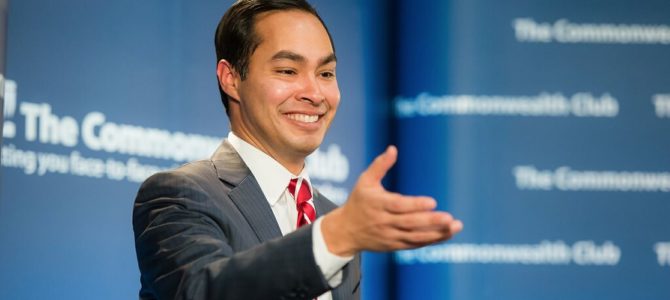
Julian Castro has pulled out of the 2020 presidential race, having failed to attract more than a few percentage points of support over the past year. He made the announcement Thursday with a four-minute video montage highlighting what he no doubt thinks were his best moments from the campaign trail: that time he explicitly called for open borders during a Democratic debate, all those times he called for an end to “police brutality,” the time he castigated the Democratic Party for holding early primaries in states unlikely to vote for him.
Like his entire campaign, the video was an exercise in virtue-signaling and identity politics, with a special emphasis on how Castro particularly cares for the poor and marginalized. It ended, as you might expect, with Castro earnestly intoning, “¡Ganáramos un día!” (One day we’ll win!)—a parting reminder that he was the only Hispanic candidate in the Democratic field and that yes, he pretty much speaks Spanish.
Although his campaign never really gained momentum, Castro is nevertheless important as a harbinger of what the left is doing to the Democratic Party, how it is elevating race, sex, and even immigration status as the only crucial factors in our political life, all in the service of a narrative that America is racist, misogynistic, and cruel—the sort of place that can only be redeemed by a thoroughgoing progressive revolution.
It’s with profound gratitude to all of our supporters that I suspend my campaign for president today.
I’m so proud of everything we’ve accomplished together. I’m going to keep fighting for an America where everyone counts—I hope you’ll join me in that fight. pic.twitter.com/jXQLJa3AdC
— Julián Castro (@JulianCastro) January 2, 2020
Despite Second-Tier Status, Castro Pushed the Field Left
Castro’s approach to campaigning embodied this leftward shift. In such a crowded field, his appeal was largely based on the fact that he’s Hispanic—or chicano, in his awkward 1970s radical parlance. Being the only Hispanic in the race allowed him to more or less declare himself uniquely qualified to represent the disparate identity groups that now make up the base of the Democratic Party (and by extension, America) and position himself as an ideal standard-bearer for social justice.
This posture emboldened him in reckless but telling ways. Back in August, his brother and campaign chairman Rep. Joaquin Castro tweeted the names and employers of 40 San Antonians who supported Trump’s reelection, then justified it by saying they were “fueling a campaign of hate that labels Hispanic immigrants as ‘invaders.’”
These were not wealthy donors of the sort the Obama campaign publicly shamed for supporting Mitt Romney in 2012, they were ordinary people—small business owners and retirees—who gave the federal maximum individual donation of $2,800. That’s all it took for the Castro brothers to label them as fuelers of hate and invite the Internet to harass and threaten them. (Keep in mind, this is a presidential campaign we’re talking about, and Castro isn’t some fringe political figure; he was a former housing secretary under Obama, and his brother is a sitting congressman.)
Although the other Democratic candidates have yet to adopt this particular no-holds-barred tactic, some of them did feel compelled during the first Democratic debate in June to support Castro’s radical proposal to decriminalize illegal border crossings. After a testy exchange over the issue with fellow Texan Beto O’Rourke, decriminalizing the border became a kind of instant litmus test for Democrats on the stage, which at least two eventual frontrunners, Sen. Elizabeth Warren and Pete Buttigieg, decided they needed to pass.
That June debate, which The New York Times said Castro won, was also when Castro and other Democrats went on record saying they support taxpayer-funded health care for illegal immigrants, a position Castro reiterated in the days following the debate.
Maybe We Haven’t Seen the Last of Him
Castro might be out of the running for president, but if his farewell video is any indication, he’s still very much running for vice president. In a way, he’s been running for vice president this entire time, which makes sense in light of what’s happening to the Democrats.
If the nominee is an old white man like Joe Biden or Bernie Sanders, or even a white woman like Elizabeth Warren, Castro might be an attractive running mate, someone who supposedly appeals to Hispanic voters and can attract social justice progressives.
That’s the theory, anyway. In reality, the general electorate is significantly less progressive than the Democratic Party base Castro tried so hard to win over. The question for Democrats is, can they resist the demands of their left-wing and nominate a more centrist candidate who actually has a shot at attracting moderate Democrats, independents, and maybe even disaffected Republicans?
If they can’t, we’ll be able to look back at Castro’s campaign as a preview of where the Democrats are headed, even if the rest of country isn’t willing to follow.









